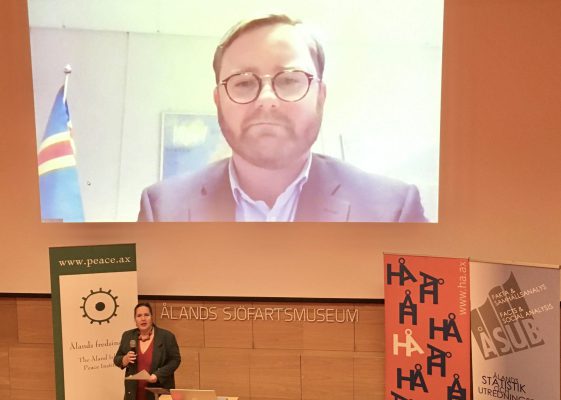To ensure sustainable development, autonomous regions must “think for themselves” and provide inspiring, inclusive and dynamic environments for developing new ideas, as well as attract young people to stay or to return to the region. Strategies, cooperation, digitalizationand investments on infrastructure are perquisites for knowledge development and research. What are the key development areas of Åland, and what is happening in other regions?
These thoughts and questions where discussed on 22 October when the KUT-network (Network for sustainable knowledge development on Åland) organized a conference on the subject “Knowledge and Research as Motors for Regional Development and Innovation”.
The first half of the conference was held in English with four keynote speakers: Günther Rautz, EURAC Research in South Tyrol Italy, Nina Harjunpää, University Association of South Ostrobothnia, Annika Sølvará, the Research Council in Faroe Islands, Jouko Kinnunen, ÅSUB.
The conference can be watched on the youtube channel of the Åland Islands Peace Institute.
In the first half of the conference, Director of the Åland Islands Peace Institute, Sia Spiliopoulou Åkermark, welcomed the speakers and the audience, and Minister of Development Alfons Röblom opened the conference with his forewords. Minister Röblom noted that the themes of the conference go hand in hand with a long tradition of Åland Islands to be able to do things self when possible but also search for inspiration from outside when needed.
Four keynote speakers gave their insight on knowledge development in different regions.
Dr Günther Rautz, Managing Director of the Institute for Minority Rights at EURAC Research in South Tyrol, Italy, gaves an overview on the development and growth of the institute and the role of EURAC in the autonomous South Tyrol today. Established in 1992 with 12 employees, the institute has grown to employ 300 researchers from 30 countries.
Nina Harjunpää, Senior Planning Officer at the University Association of South Ostrobothniapresented how Epanet, the Research and Innovation Programme of South Ostrobothnia, is developing new research culture with increased cooperation between universities, research institutes, businesses and local organizations.
Annika Sølvará, Director of the Research Council in Faroe Islands, told about how theautonomous Faroe Islands work with research politics and financing.
Jouko Kinnunen, Head of Research of Statistics and Research Åland (ÅSUB), spoke about Åland´s economic success and challenges as well as growth, resources, and ‘smart regions’.
The first half of the conference was concluded with a discussion on comparative experiences in English, moderated by Hanna Hagmark, Director of Åland Maritime Museum. After lunch, the conference continued with a panel discussion in Swedish.
Thomas Lundberg, CEO at Crosskey, Martha Hannus, sustainability strategist at Emmaus Åland, Johanna Mattila, Rector of Åland University of Applied Sciences, Anders Gustafsson, engineer at Pedago, Pernilla Weckman, CEO at April Kommunikation andAnders Ekström, CEO at the Åland Chamber of Commerce, took part in the discussion on Åland’s need for developing local knowledge and competence in order to enable possibilities for expertise, reseach and innovation.

The conference took place at the Åland Maritime Museum and a limited number of seats for audience were available. Around 50 persons followed the conference live from the Peace Institute’s youtube channel where the conference is still available.
The conference was arranged by the Network for Sustainable Knowledge Development on Åland (the KUT-network) in cooperation with the Government of Åland. Members of the network are the Åland Islands Peace Institute, that initiated the cooperation in 2018, ÅlandUniversity of Applied Sciences, Statistics and Research Åland (ÅSUB), Åland Maritime Museum, Government of Åland and Mariehamn City Library.



